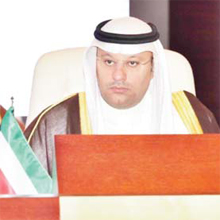 Kuwaiti Minister of Health Dr Ali Al-Obaidi
Kuwaiti Minister of Health Dr Ali Al-ObaidiDOHA: The GCC countries approved a joint guideline for strategic medical reserves including medicines and equipment, said Kuwaiti Minister of Health Dr Ali Al-Obaidi.
The guideline aims to create further cooperation between the GCC states during disasters and crises, the minister said after heading the Kuwaiti delegation at the second meeting of the GCC Committee of Health Ministers yesterday.
The meeting discussed several health topics, including the equality in providing medical services to all GCC citizens, procedures of receiving medical treatment abroad, strategic cooperation between the Gulf countries with Turkey, Jordan and Morocco and further participation in regional and international health care meetings, Al-Obaidi noted. Curbing obesity, diabetes
Meanwhile, Saudi Minister of Health Khalid bin Abdulaziz Al-Faleh urged Arab Gulf countries to increase their efforts, especially awareness campaigns, to help curb the spread of obesity and diabetes in the region. Speaking at the opening of a conference on controlling obesity and diabetes in the Gulf Cooperation Council states, Al-Faleh underlined the need for persuading and encouraging people adopt healthy lifestyles. He suggested building a partnership between public and private institutions in the region to curb the spiral of the obesity and its related diseases.
According to figures of the International Diabetes Federation (IDF), roughly one in five people has diabetes in the Arabian Gulf region.
The IDF data also shows that three Gulf countries, namely Kuwait, Saudi Arabia and Qatar, are in the top 10 nations globally for the highest prevalence of the disease. There are more than 34.6 million people in the Middle East and North Africa have diabetes, which accounts for 10.9 percent of people world-wide with the disease, and costs governments in the region more than $12 billion in treatment each year, the IDF has revealed. - Agencies










